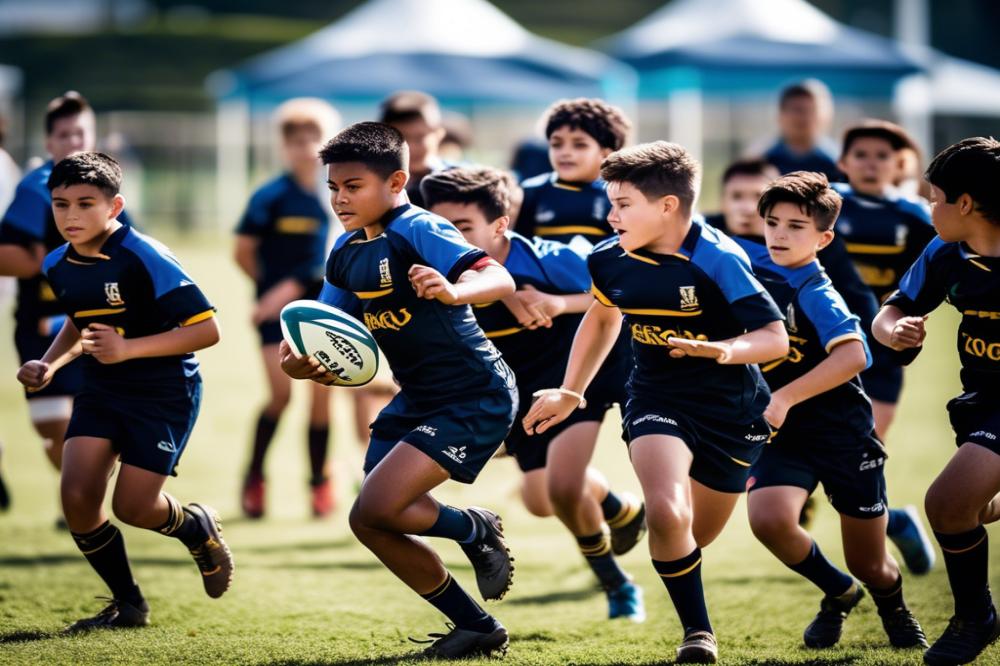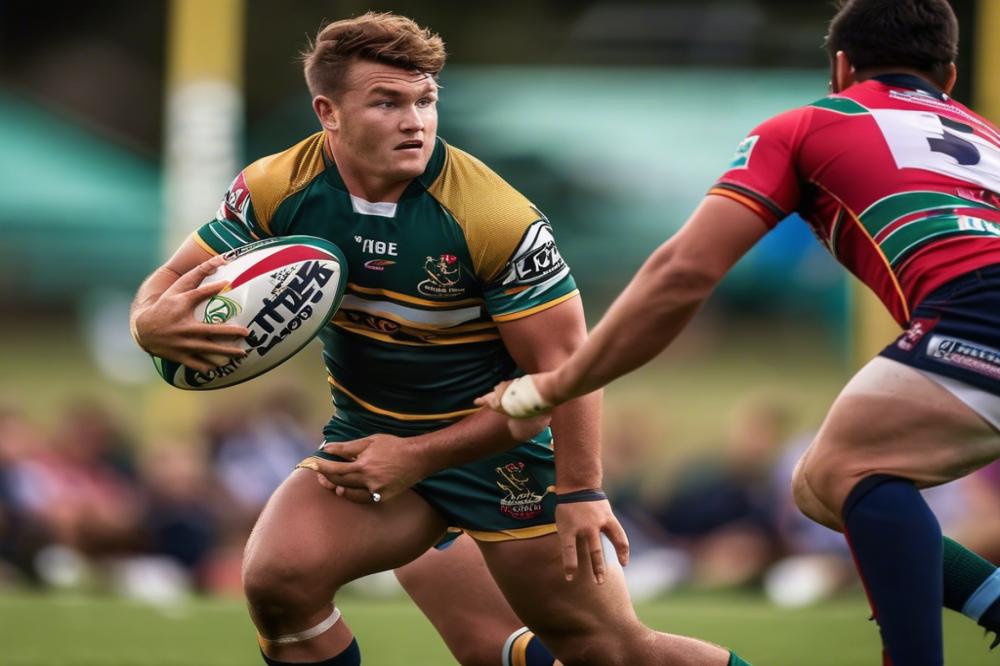The Role of Schoolboy Rugby League in player development
Schoolboy rugby league stands as a cornerstone in the progression of young athletes toward the professional realm, particularly in the National Rugby League (NRL). With its unique contribution to nurturing talent, it acts as a critical stepping stone for many aspiring players. These formative years are filled with both challenges and growth, where boys learn not only the game itself but also essential life skills.
Rugby league at this level introduces players to a structured environment. Young athletes are trained in the fundamentals of the sport, which builds a solid foundation for future success. Skills acquired during this period are integral as they transition into more competitive settings. The importance of schoolboy rugby league in the #main_keyword# cannot be underestimated. It serves as the grassroots level that fuels the higher tiers of the sport.
This article aims to explore how schoolboy rugby league influences the development of future NRL stars. We seek to understand its impact on skill acquisition and physical growth. Additionally, the discussion will delve into how this environment fosters an appreciation for #anchor_text_1#. We will also highlight the role this early involvement plays in nurturing a passion that extends beyond the field.
Understanding the journey from schoolboy rugby league to professional athletics is essential. This pathway encourages young talents to dream big while staying grounded. The players’ evolution during these years merits close examination, shedding light on the crucial balance between discipline and enjoyment. In summary, the objective is to uncover the elements that make schoolboy rugby league a vital part of the #anchor_text_2#.
The Importance of Early Development

Schoolboy rugby league lays a vital groundwork for budding players. It offers young athletes the opportunity to gain foundational skills essential for their future careers. Basic techniques, whether tackling, passing, or strategic thinking, are introduced during these formative years. Such skills become second nature with consistent practice.
Cognitive benefits are notable when young athletes participate in rugby league. The sport demands quick decision-making and adaptability, sharpening their mental acuity. Players learn to assess game situations rapidly and adjust strategies on the fly. This mental agility transcends the sports field, aiding in academic and life challenges.
Physical advantages are equally profound. Rugby league promotes robust physical fitness through regular practice and matches. Young athletes benefit from improved coordination, balance, and increased cardiovascular health. These physical gains contribute to the overall well-being and stamina of the players.
School-based competitions play a pivotal role in molding teamwork and discipline. Young players learn the value of working harmoniously with teammates and respecting coaches’ directions. This camaraderie fosters a supportive environment where athletes grow together. Discipline becomes inherent as regular training and committed participation in games instill a sense of accountability and responsibility.
Pathway to Professional NRL

Schoolboy rugby league plays a key role in nurturing future NRL stars. The journey from school fields to professional arenas involves integration with established NRL pathways. These pathways are designed to guide aspiring athletes in their pursuit of a professional career.
Integration into NRL Pathways
From a young age, players participate in school leagues that feed into national programs. These programs are closely connected to NRL clubs, providing young talent with opportunities to be noticed. The school leagues are often a first step, directly linking students to higher-level competitions.
Programs and Scouting Processes
Significant programs such as the Harold Matthews Cup and SG Ball Cup allow young athletes to compete at high levels. Scouts frequently attend schoolboy games to evaluate emerging players. These scouts look for skill, determination, and potential. Young players who stand out may get invited to join junior development squads, paving the way for future success.
Scholarship and Advancement Opportunities
School competitions open doors to scholarships for talented individuals. Scholarships often cover tuition, gear, and training expenses. These financial aids support young players while they focus on developing their abilities. Participating in these competitions can significantly increase a player’s chances of advancing to professional levels.
Skill Specialization and Physical Conditioning

Specialized Positions and Skills
Schoolboy rugby leagues play a critical role in teaching young athletes specialized skills tailored to specific positions. Each player learns responsibilities unique to their role on the field. For instance, a scrum-half requires agility and quick decision-making. Conversely, a prop needs strength and stability. Coaches guide students to understand these varied complexities. They nurture talents from an early age, focusing on both individual and team capabilities.
Training Programs for Physical Conditioning
Training routines in schoolboy leagues emphasize age-appropriate physical development. Programs cater to building stamina, enhancing speed, and improving strength. However, they carefully avoid over-training and stress injury prevention. Youth-targeted sessions incorporate activities like circuit training and plyometrics. These workouts align with developmental needs and prevent early burnout. Guidance ensures that young players grow in a healthy, balanced way.
Balancing Sports and Academics
Balancing sports with academic responsibilities is essential for schoolboy rugby participants. Programs often coordinate timetables to prioritize educational commitments. Student-athletes are encouraged to maintain academic performance alongside physical training. Schools provide support through study sessions and flexible scheduling. Teachers and coaches collaborate, emphasizing holistic growth. This dual focus prepares students for future challenges beyond the pitch.
Talent Identification and Support Networks
Spotting young rugby league stars starts with eagle-eyed scouts and dedicated coaches. They search fields and watch endless school matches to identify those with promising skill and raw potential. Scouts pay close attention to how players handle pressure and work as a team. It’s not just about physical strength but mental toughness as well.
Once talent is spotted, support networks come into play. Coaches often become mentors, offering guidance and training specific to a player’s needs. They cultivate a nurturing environment for growth. Family plays an equally vital role, offering encouragement and emotional backing. Parents and siblings often sacrifice time and resources for the athlete’s well-being. Schools, too, provide academic and moral support, ensuring that players balance their education with sporting commitments.
Partnerships between schools and professional clubs are increasingly common. These alliances are crucial for nurturing talent while providing real-world opportunities. Clubs collaborate with schools to offer specialized training programs and workshops. This relationship benefits students by opening doors to professional leagues. It also allows clubs to develop talent from a young age within a structured environment. Taken together, this network of scouts, mentors, family, and institutions forms a strong foundation for budding athletes.
Challenges and Opportunities
Schoolboy rugby league offers a dynamic environment for young athletes, yet it’s not without its hurdles. Physical injury remains a significant concern. Players face impacts that can lead to both minor and serious ailments. The need to protect young bodies is paramount. At the same time, students must balance their educational pursuits. Studying while maintaining sports commitments can be demanding. Many find it tough to juggle homework with training sessions.
Despite these challenges, robust opportunities abound. School competitions ignite a passion for the sport. Talented individuals may earn representative honors that can open doors. Success in these arenas can lead to further athletic and academic rewards. Beyond the school grounds, paths to professional levels sometimes begin here.
Diversity remains a topic of interest within schoolboy rugby leagues. Inclusiveness is essential to enrich the community. Opportunities for players of different backgrounds can foster unity. Ensuring everyone feels welcome and valued is critical. Promoting a culture of respect is as vital as learning game tactics.
The Significance of Schoolboy Rugby League in Shaping Professional Players
Schoolboy rugby league serves as a pivotal stepping stone in the journey of many successful NRL players. During these formative years, young athletes acquire essential skills that go beyond mere physical prowess. The sport ingrains discipline, teamwork, and strategic thinking—qualities indispensable at the professional level. Through school competitions, players learn to handle pressure while developing a love for the game, nourishing their potential right from the grassroots.
Balancing academics and sports is crucial. Educational pursuits should never take a backseat to athletic aspirations. A well-rounded education fosters critical thinking and resilience. Players who excel both on the field and in the classroom often exhibit a competitive edge. Their understanding of complex strategies and their ability to adapt to new situations can be traced back to these early school experiences. Young athletes gain holistic development, preparing them for challenges both in sports and life.
Looking forward, improving pathways for players through school programs is an ongoing challenge. Schools and sports organizations need to collaborate more closely. Providing better resources and support systems for young talent is vital. Ensuring easy access to quality training and education will aid in honing skills effectively. With such enhancements, the foundation laid by schoolboy rugby league will remain instrumental in nurturing the next generation of NRL stars.
Future strategies must consider inclusivity and equal opportunity for all aspiring players. An inclusive approach encourages diversity, enriching the talent pool. Embracing these changes can yield even greater success stories. The goal is to maintain integrity and passion in the sport while equipping players with necessary life skills. By fostering strong educational and athletic foundations, we can continue to see the flourishing of future rugby league champions.
Through dedication and strategic efforts, the role of schoolboy rugby league in player development is bound to prosper. The fusion of academic and athletic pursuits is not just compatible—it is essential. The essence of success lies in comprehensively nurturing #anchor_text_3# talent. As the pathways evolve, the focus must remain on the holistic growth of students, ensuring they thrive as both individuals and athletes.



